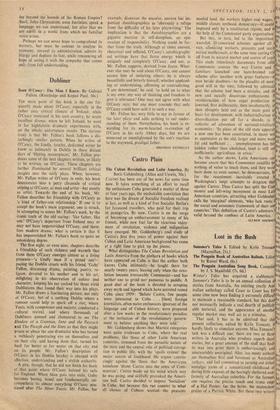Dubliner
THE main point of this book is the one fre- quently made about O'Casey, especially in the rather cosy critical climate of Ireland; while O'Casey remained in his own country, he wrote excellent drama; when he left Ireland, he went in for highfalutin dramatic experiments with, on the whole, unfortunate results. The curious irony is that Mr. Fallon's book follows a dis- turbingly similar pattern. When he writes of O'Casey, the kindly, touchy, dedicated writer he knew so intimately in Dublin in those distant days of `blazing masterpieces,' Mr. Fallon pro- duces some of the best chapters written, or likely to be written, on O'Casey. These chapters are further illuminated by several brilliant critical insights into the early plays. When, however, Mr. Fallon writes of O'Casey in exile, his book deteriorates into a petty chronicle of critical
sniping at O'Casey, as and artist—but mostly as artist. Towards the end of his book, Mr. Fallon describes his friendship with O'Casey as `a kind of father-son relationship.' If one is to accept the book's main argument, one is struck, in attempting to assess Mr. Fallon's work, by the ironic truth of the old saying: 'like father, like son.' O'Casey's departure from Ireland may or may not have impoverished O'Casey, and there- fore modern drama; what is certain is that it has impoverished Mr. Fallon's book to quite an astonishing degree.
The first eight, or even nine, chapters describe a friendship of such richness and warmth that from them O'Casey emerges almost as a living presence—`a kindly man if a proud one'—
pacing the Dublin streets with his friend, `Gaby' Fallon, discussing drama, painting, poetry, re- ligion, devoted to his mother and to his art, delighting in his observation of colour and character, keeping his ear cocked for those vivid Dublinisms that found their way into his plays.
Mr. Fallon draws a fascinating picture, not only of O'Casey, but of a seething Dublin where a rumour could help to spark off a riot; where Yeats, with competence and majesty, conducted a cultural revival, and where thousands of
Dubliners queued and clamoured to see The Shadow of a Gunman, Juno and the Paycock and The Plough and the Stars so that they might
praise or abuse the one dramatist who has turned a ruthlessly penetrating eye on themselves and on their city, and having done that, turned his back for better or for worse on that city and on its people. Mr. Fallon's description of O'Casey in his Dublin heyday is charged with affection, understanding and a stylish authority.
A pity, though, that he did not finish his book at that point where O'Casey hoisted his sails
for England. When Sean goes into exile, Gaby becomes boring, banal and fundamentally un- sympathetic to almost everything O'Casey pro- duced after The Silver ramie. Mr. Fallon, for example, dismisses the massive, uneven but im- portant Autobiographies as `obviously a refuge from the difficulty of his later playwriting.' The implication is that the Autobiographies are a gigantic exercise in self-deception, an epic evasion of responsibility. Nothing could be far- ther from the truth. Although at times uneven, rhetorical and inflated, O'Casey's autobiographi- cal writings have that fierce energy which is uniquely and completely O'Casey, and not, as Mr. Fallon suggests, derived from Joyce. What- ever else may be said about O'Casey, one cannot accuse him of imitating others; he is always beautifully and bitterly himself, whether applaud- ing or undermining, affirming or contradicting. `I am determined,' he said, `to hold on to what is my own; my way of thinking and freedom to give it utterance.' One may not agree with what O'Casey says; but one must concede that only O'Casey could have said it in such a way.
Mr. Fallon has very little to say in favour of the later plays and adds nothing to ou'r under- standing of them. Nevertheless, his book is re- warding for its warm-hearted re-creation of O'Casey in his early Abbey days, but we are unmoved or unenlightened by the son's reaction to the wayward, prodigal father.
BRENDAN KENNELLY










































 Previous page
Previous page